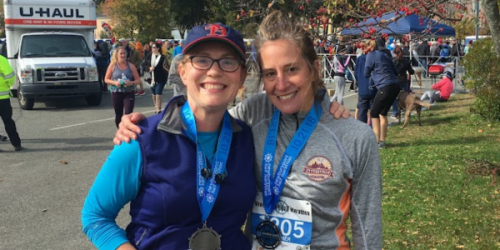Some of you may already know this, but I identify as a runner. I love it. Okay, I hate it sometimes, too, and I am not very fast, but there’s something about lacing up my shoes and setting out in the open air under my own bipedal power that invigorates me.
Many years ago, I decided to run the Marine Corps Marathon in Washington, D.C., which required heavy preparation to run the 26.2 miles. I joined with other runners who secured coaches and trainers to help us accomplish our goal: a coordinator of training runs, a highly skilled coach to model good technique and offer individualized feedback to help us improve, and lots of time on the road. My training was successful only because each person brought their expertise to coordinate a high-quality program that simulated what I would face on race day.
It’s the same for aspiring teachers. Teacher preparation isn’t a sprint; it’s a marathon. And just like preparing for a long race, it requires well-planned practice, feedback, and the guidance of experts who facilitate a great clinical practice experience that prepares every teacher for the realities of the classroom.
Unfortunately, many new teachers report that they felt completely unprepared for the classroom—for behavioral challenges, for pivoting when a lesson goes awry, for teaching multilingual learners, for implementing the curriculum. Quite often, this is a result of new teachers not having enough high-quality, hands-on practice.
When teachers’ clinical practice experiences are not strong, their students lose out on learning, while the new teachers struggle to learn on the job. Students of color and students living in poverty bear the brunt of that loss, as they are persistently assigned to brand new teachers at higher rates than white students and more affluent students.
It doesn’t have to be this way. The research shows us that strong clinical practice experiences can yield first-year teachers who are as effective as teachers in their second or third year in the classroom—and they are more likely to stay longer in the classroom. Strong clinical practice experiences can also contribute to diversifying the teacher pipeline and to retaining teachers of color.
Last week, NCTQ published a new Clinical Practice Framework to help teacher prep programs, school districts, and state leaders build strong clinical practice experiences for aspiring teachers. The framework is based on a review of the research, input from experts in the field, and extensive outreach with leaders in teacher prep programs and districts. We also took care to define what we mean by clinical practice, since the structure varies widely and some prep programs use terms (such as “residency”) that suggest a greater level of preparation than they actually offer.
In the framework, NCTQ distills the six focus areas of clinical practice backed by research and the field as the most important for building a quality clinical practice experience:
- Strong district–prep program partnerships
- Student teacher–cooperating teacher matches
- Cooperating teacher and program supervisor training
- Student teacher placement sites
- Student teacher skill development
- Data and outcomes
We outline why each focus area matters, what the field says (and sometimes, it’s contradictory), and actions for prep programs, districts, and states. Well-structured clinical practice depends on effective partnership among these core actors, each of whom has a specific role to play. The framework can help core actors identify the aspects of their clinical practice programs that are already aligned with the evidence and illuminate opportunities to improve. Just think: By investing in strong clinical practice, we could accelerate first-year teachers’ growth and positive results by one year—or in some cases, two!
This summer, NCTQ will release a clinical practice action guide, a companion to the framework that will describe case studies of teacher prep programs, school districts, and states when they are effectively enacting the focus areas and provide resources to help others follow in their footsteps. If you would like to share your practices with NCTQ to be considered for a feature in the Clinical Practice Action Guide, please reach out to me (heather.peske@nctq.org).
Like running a marathon, teaching can be very challenging, and it is most rewarding when you are prepared to do it well. Aspiring teachers need high-quality practice experiences in real classrooms, with the support of effective cooperating teachers to guide them. This kind of practice needs to be well-considered, well-organized, and well-executed by teacher prep programs, school districts, and state leaders. NCTQ’s Clinical Practice Framework offers these leaders the frame they need to build a great clinical practice experience for teachers and sets them up for a successful, long-term run in our public schools.
More like this

Building a strong student teaching model: Districts and teacher prep programs share successes and challenges
Here’s what we learned about what’s going well and what’s been challenging in building a strong clinical practice experience, as well as which policies and supports could lead to better experiences.

